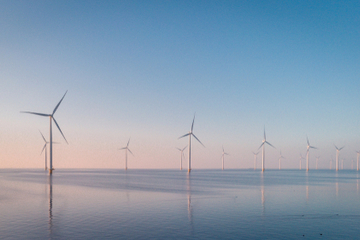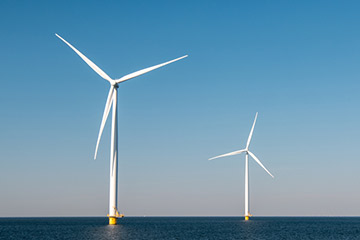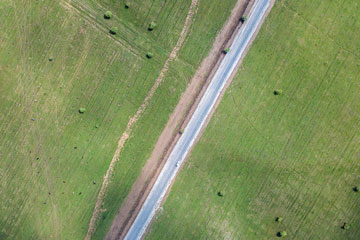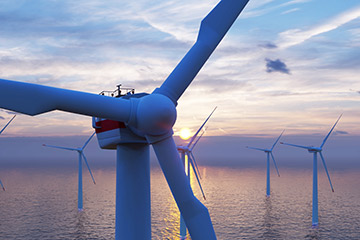New draft legislative bill will provide a framework for increased integration of renewable energy
14 March 2023
The draft legislative bill to amend the Electricity Supply Act and the Electricity Tax Act enables, among other things, the establishment of commercially owned direct lines, lifts the prohibition on geographically differentiated consumption tariffs and codifies the Danish Energy Agency's practice on internal electricity connections.
Update: The 2nd and 3rd reading of the draft legislative bill has been postponed to the end of April 2023, and the date of entry into force is therefore expected to be postponed to an as yet unknown date.
On 23 February 2023, the Danish Parliament held its first parliamentary reading of the draft legislative bill amending the Electricity Supply Act and the Electricity Tax Act (L 37).
The bill is a follow-up to the PtX agreement of March 2022 on direct lines, geographically differentiated consumption tariffs and local collective tariffing, the COP26 agreement "No new coal compact" and the agreement of 18 December 2020 regarding the implementation of RE-II article 21 on a special scheme for municipal PV cells and PV cell analysis.
The overall purpose of the bill is to support the green transition towards the Danish target of 70% CO2-reduction in 2030 and further towards climate neutrality.
The bill is expected to enter into force on 1 April 2023.
The bill contains the following measures:
A direct line is an electricity connection, not established, maintained or owned by a DSO or the TSO, which is intended for the direct supply of electricity from an undertaking's electricity generating installations to its own facilities or subsidiaries or to specific customers and which replaces, in whole or in part, the use of the public electricity supply grid.
The permit for the establishment of direct lines is subject to the fulfillment of a number of criteria, which are expected to be specified in an executive order. As a general rule, electricity consumption through direct lines does not exempt the owners of the consumption facilities from having to pay VAT and taxes, including electricity tax.
It will also be possible to exempt local collective tariffing from the prohibition on geographical differentiation at all voltage levels in the case of local associations of grid users that control both consumption and production.
On 23 February 2023, the Danish Parliament held its first parliamentary reading of the draft legislative bill amending the Electricity Supply Act and the Electricity Tax Act (L 37).
The bill is a follow-up to the PtX agreement of March 2022 on direct lines, geographically differentiated consumption tariffs and local collective tariffing, the COP26 agreement "No new coal compact" and the agreement of 18 December 2020 regarding the implementation of RE-II article 21 on a special scheme for municipal PV cells and PV cell analysis.
The overall purpose of the bill is to support the green transition towards the Danish target of 70% CO2-reduction in 2030 and further towards climate neutrality.
The bill is expected to enter into force on 1 April 2023.
The bill contains the following measures:
Direct lines
The bill makes it possible to establish commercially owned direct electricity lines for electricity customers and producers connected to the electricity grid at a voltage level of 10 kV and above. The purpose of the measure is to ensure better framework conditions for green technologies, e.g. PtX plants, and to contribute to increased integration of renewable energy in the electricity grid by promoting an appropriate location of electricity consumption and production. This makes more efficient use of grid capacity, which can reduce the need for investments in the grid.A direct line is an electricity connection, not established, maintained or owned by a DSO or the TSO, which is intended for the direct supply of electricity from an undertaking's electricity generating installations to its own facilities or subsidiaries or to specific customers and which replaces, in whole or in part, the use of the public electricity supply grid.
The permit for the establishment of direct lines is subject to the fulfillment of a number of criteria, which are expected to be specified in an executive order. As a general rule, electricity consumption through direct lines does not exempt the owners of the consumption facilities from having to pay VAT and taxes, including electricity tax.
Geographically differentiated consumption tariffs and local collective tariffing
The draft legislative bill makes it possible for the Danish TSO, Energinet, and grid companies to differentiate consumption tariffs geographically for electricity customers connected to the electricity grid at 10 kV voltage level and above, as well as local associations of grid users. The prohibition on geographically differentiated consumption tariffs will thus be repealed. The repeal will allow Energinet and the grid companies to differentiate the connection fee depending on whether there is available capacity in the electricity grid for additional consumption or where there is a lot of electricity production. Geographically differentiated consumption tariffs can thereby provide an economic incentive for larger electricity customers, such as PtX plants, to locate in areas with available grid capacity, e.g. production-dominated areas.It will also be possible to exempt local collective tariffing from the prohibition on geographical differentiation at all voltage levels in the case of local associations of grid users that control both consumption and production.







